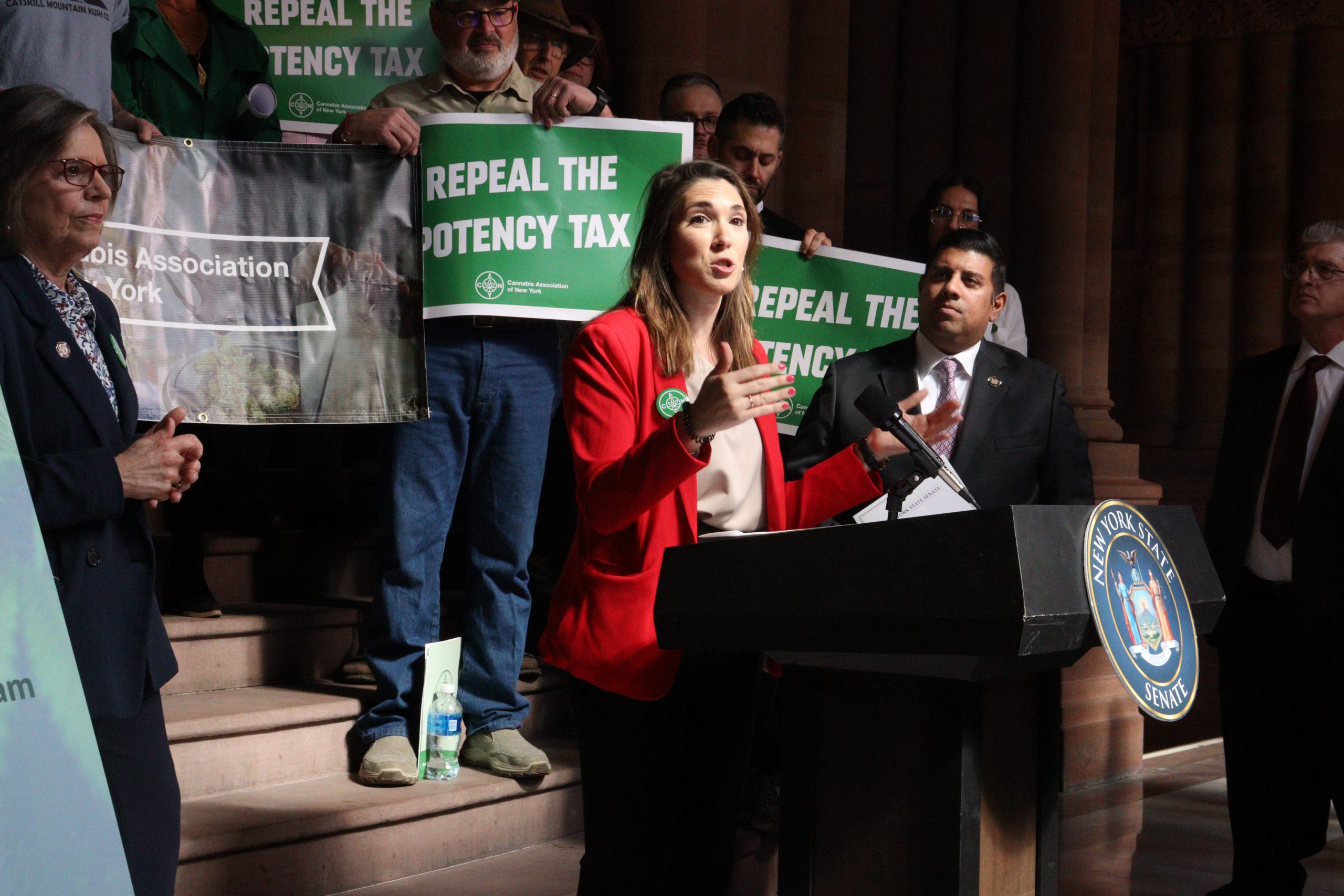
Sen. Michelle Hinchey, at podium, the chair of the Senate Agriculture Committee, is joined by Assemblywoman Donna Lupardo, left, and Sen. Jeremy Cooney, right, at the Cannabis Association of New York’s lobby day in Albany on March 28, 2023. On Monday October 30, a Senate hearing shed light on many of the issues that are preventing the legal cannabis market from becoming fully operational in New York.
The New York State Senate Subcommittee on Cannabis held its first public hearing in Albany on Monday to shed light on the issues that have been preventing the legal cannabis market from becoming fully operational.
During the hearing — which bore witness to many problems that have plagued New York’s legal cannabis market over the past few years — a few issues stood out, being referenced repeatedly. Licensing problems, the existence and regulation of illegal dispensaries and preventing the monopolization of the industry were overarching issues that affected most of the witnesses at the hearing in some capacity.
Led by Senator Jeremy Cooney, D-Rochester, the chair of the Subcommittee on Cannabis, the joint hearing lasted nearly nine hours and hosted 13 witness panels consisting of 38 persons involved with the cannabis industry, including regulators, retailers, farmers’ associations, law enforcement, medical marijuana organizations and more.
The length and capacity of the hearing was a testament to the scale and impact the cannabis industry already possesses, in spite of its shortcomings.
Cooney was joined by Senator Liz Kruger, D-Manhattan; Senator Michelle Hinchey, D-Kingston; and Senator James Skoufis, D-Cornwall. The senators serve as the chairs of Senate Standing Committees on Finance, Agriculture, and Investigations and Government Operations, respectively.
Due to the broad nature of New York’s cannabis market, lawmakers representing several committees were present at the public hearing. A full hearing room was also an indication of the heavy interest in this topic by industry stakeholders and members of the public.
Sen. Krueger was the main sponsor of the Marijuana Regulation and Taxation Act, which was the bill that legalized recreational marijuana use in New York, back in 2021.
“When we passed this law, which took seven years to pass, we thought we had thought through everything,” said Krueger. “So, I’m very interested in hearing from all of you; what you think is working, what you don’t think is working and why.”
Since the passage of the MRTA, the legal adult-use cannabis market has been extremely underwhelming in its implementation due to numerous obstacles that existed and impacted the industry at virtually every level. Currently, only 26 legal dispensaries are actually open and operating, a paltry number well below expectations.
At the hearing, Skoufis spoke on the non-existence of dispensaries in his district of the Hudson Valley.
“Most, if not almost all, the stakeholders who I have interacted with, have viewed the rollout over the [past] 943 days as challenging, to put it kindly, if not unsuccessful, or a failure,” Skoufis said.
His constituents’ situations are not unique, either. With zero dispensaries being open in the Hudson Valley, as well as other regions in the state, the lack of transparency surrounding the industry is only stoking frustrations. As such, the hearing’s purpose was to examine all levels of the cannabis market and their associated challenges and obstacles.
The state-established Office of Cannabis Management, which was founded to oversee the market and issue cannabis retail licenses, received heavy scrutiny at the hearing. Chris Alexander, the executive director of the OCM, was the first witness to testify on Monday. As head of the OCM, he fielded numerous questions pertaining to his office’s actions regarding the rollout of the legal, adult-use cannabis market. He spent much of his time before the hearing advocating for his office and its contributions.
Alexander prefaced his testimony, stating, “We are two years into this experiment. I want you all to know it is working. We have launched the most diverse and equitable [cannabis] market in the nation.”
Despite its slow start due to staffing issues, the OCM has managed to grow the state’s cannabis industry, Alexander testified. The market does exist and makes money, he noted, albeit not at the expected level. “The market has already generated over $100 million in retail sales,” Alexander said.
Underperforming sales can also be attributed to the existence of a widespread illegal cannabis businesses across New York. With estimates of illegal dispensaries numbering in the thousands, the question of regulation and negative impact was asked repeatedly.
Illicit dispensaries take business from legitimate operations and also lead to public health issues. A glaring problem lies in the actual regulation of illicit activity. OCM has its own inspectors who coordinate with law enforcement to restrict such businesses. However, at the hearing it was questioned whether the fines imposed on illicit dispensaries are actually effective, as they still exist en masse.
The regulation of such illegal dispensaries and the implementation of legitimate, licensed cannabis businesses was stressed as the answer for many of the witnesses who testified. Having a safe, regulated product that is locally grown benefits the farmers, retailers and consumers and even non users.
Of course, in order to be legitimate, one needs a license.
The first implementation of issuing licenses lay in the Conditional Adult-Use Retail Dispensary (CAURD) Program, which serves to benefit those affected by the previous war on drugs and programs policing programs such as “stop and frisk” tactics. The CAURD Program was established with the aim of social justice. But due to staffing issues, litigation and lawsuits, approving applications became slowed and even halted in some instances.
CAURD’s secondary purpose was to encourage the growth of small businesses. However, between the legal setbacks and general licensing on the agenda, questions about the monopolization of the cannabis industry are being asked. Even medical marijuana organizations were under scrutiny. As such, representatives from such companies, like Acreage Holdings and Columbia Care, were also present.
WATTCH: Cannabis growers discuss New York’s retail cannabis market. Video produced by Quintin Fisher.
These large-scale issues were addressed at the hearing for the purpose of shedding light on the underperforming cannabis market. Lawmakers spoke on behalf of their affected constituents, sometimes irately when questions were left unanswered or addressed ambiguously. Many points were covered in hopes of providing some solutions. Legislation, like the Cannabis Crop Rescue Act, was referenced, which would extend the cannabis industry to New York tribal nations. They spoke of eliminating the THC potency tax, which is a complicated tax unique to the cannabis market.
The hearing brought many issues to light, but remains only a step in helping the New York legal adult-use cannabis market realize its full potential.









